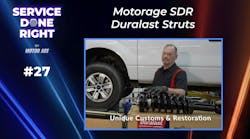Scan tools are among the most important pieces of equipment in the modern mechanic's toolbox. They allow us to view stored diagnostic trouble codes and look at real-time data from sensors and modules integrated within all the various systems of today's vehicles.
We technicians depend on them to make a living, as it is almost impossible to fix a car without a scan tool. And as technology advances, we will rely on them more and more, because just about everything that is electronic in automobiles today is accessed using one. This includes diagnosing customer complaints like drivability problems, emission failures, HVAC malfunctions, electronic suspension concerns and check engine lights. Almost every service situation begins and ends with the OBD II connector.
This makes my scan tool the first thing I grab in the morning and the last thing I put away before I go home at night. It serves as my compass, leading me in the right direction by displaying trouble codes, ECU and sensor data, and more. Without this information, I wouldn't know what tests to perform or what components to inspect.
As a result of all this enhanced technology, today's scan tools are complicated, and have as many features as the vehicles we service. So, some technicians may find it hard to figure out which scan tool will best meet their needs. Features like color screens, data scan frequency, can bus interface, graphing, memory, built-in service information and scopes all increase the performance of the tool, but also add to its cost. Which leads a technician to ask: What do I really need?
A scan tool that is not sophisticated enough is a waste, needing to be quickly upgraded or supplemented with other tools.
However, a complex tool may be too difficult to learn, so the additional cost is not worth it when the extra bells and whistles are not used. We'll just resort to other more comfortable and time-consuming methods if we can't learn to use the extra features.
As the scan tool is one of the most expensive pieces of equipment an individual technician will buy, it is important to purchase the right one. Yet we may find it hard to decide by ourselves which one is the right one. This is where you come in. As our primary source for diagnostic equipment, we need your help to guide us and help us decide.
- It's important to match the tool to the technician. Don't try to sell a scan tool/oscilloscope/service manual combo with built-in 4 GB vehicle data recorder and color screen to an entry-level technician. Not only will he be wasting money on something he can't use, but by the time he is ready to use all of its capabilities, the tool will likely be outdated or have dropped significantly in price. Matching a technician's needs with your product will build trust, ensure customer satisfaction and lead to more sales down the line.
- Overselling will make you appear unscrupulous, only out to sell big ticket items without caring about the needs of your customers. This will hurt your reputation and jeopardize future sales.
- However, you should sell equipment that is powerful enough to be useful and increase the productivity of your customers. In my opinion, this means showing live data. This information is a necessity for technicians nowadays. Also, I feel all scan tools sold from now on should be Controller Area Network (CAN) compatible, since all new cars sold in the U.S. will be required to support CAN by 2008.
- Also, don't hesitate to loan the tool to an interested customer. Particularly with big ticket items like scan tools, allowing your technicians to try out the tools first may spark additional interest, or help them decide if a particular tool will work for them
Your customers rely on you to supply the tools they need to be productive, make money, and meet the unique demands of their business. So it's important to know your offerings and your customers well enough to match product with need. Familiarizing yourself with the scan tools you sell will go a long way in making this happen.

